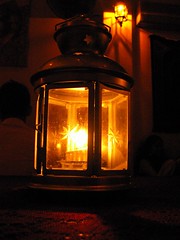Ambrosia and Christian Love
Again, we found ourselves at Ambrosia, gently cocooned in strawberry sheesha smoke, lounging on red and orange silk cushions, sipping cold drinks, nibbling on shish taouk and pita bread and chatting. They've got the ventilation and service kinks ironed out this time, so we could lie on the carpets through the night without feeling as if we were meat over a barbie.



Trailing a vague sweet sheesha scent down Baghdad Street, we had a refresher of teh tarik from the sarabat stall before the drive home.

Boon Yong made a very good observation about loving people in this week's sermon on 1 Peter 1:13-2:3. It was a good reminder of how very easy it is for us to say that we love people that we don't really know: we can say that we love the world, love our country, love our people, love the church, love our bible study group, but the more we get to know the individual people that make up that group, the more you see their failures, their weaknesses, their specific sins. Even then, we might be humble to see that every single person is fallen and prone to sin, but when their specific sin affects us and hurts us, we might not be so charitable.
Yet, Christians have been redeemed by the precious blood of Christ so that we can now live in a right relationship with God and with our brothers and sisters. Brotherly love is the goal of our salvation (v22). So we are to love each other deeply, sincerely and earnestly from a pure heart (v23).
This sort of love is a very hard task. Don Carson calls it "Love in Hard Places". It's easy to love those who love us, think well of us and generally treat us nicely.
What about love for those who hurt us? Love for "enemies big and small"? How do we do that? Craig Blomberg points out that in Matthew 5:43-48 a recurring theme is that God's love never obliterates the possibility of his wrath. It is possible to act in a loving way, especially to those who are the victims of injustice, but even to love the perpetrators of that injustice, while still taking action to prevent them from continuing to harm others. But recognising that God will ultimately avenge all wrongs, and do so more fairly than ever we could, should keep us from taking such action vindictively or harbouring grudges en route. In his book, Carson also considers enemies from within the church and the situations that would call forth church discipline according to Matthew 18:15-20 vs those situations in which we should simply show grace, forgive and move on.
Carson opines that just as there are different kinds of love in the Bible, there are also different kinds of forgiveness. He distinguishes a Christian response to repentant offenders vs dealing with the unrepentant, forgiveness in interpersonal relationships vs a God-ordained role for the state to punish evildoers, temporal forgiveness in this life vs eternal damnation for the ultimately unrepentant.
But how do we even start to love those we consider unlovable? 1 Peter 1 suggests that Christians are given the ability to love even in hard places because we have been born again, we have been given a new heart and a new will. We learn how to use this new ability and gift by looking at the living and enduring word of God in the Bible.
There, we as sons can look at and imitate what our Father in heaven does: he causes his sun to rise on the evil and the good, and sends rain on the righteous and the unrighteous (Matthew 5:45).
There, we are also reminded of how we ourselves have been forgiven by God. The parable of the Unmerciful Servant stings:
"Then Peter came to Jesus and asked,"Lord, how many times shall I forgive my brother when he sins against me? Up to seven times?"
Jesus answered,"I tell you, not seven times, but seventy-seven times.
Therefore, the kingdom of heaven is like a king who wanted to settle accounts with his servants. As he began the settlement, a man who owed him ten thousand talents was brought to him. Since he was not able to pay, the master ordered that he and his wife and his children and all that he had be sold to repay the debt.
The servant fell on his knees before him. "Be patient with me," he begged,"and I will pay back everything." The servant's master took pity on him, canceled the debt and let him go.
But when that servant went out, he found one of his fellow servants who owed him a hundred denarii. He grabbed him and began to choke him. "Pay back what you owe me!" he demanded.
His fellow servant fell to his knees and begged him,"Be patient with me, and I will pay you back."
But he refused. Instead, he went off and had the man thrown into prison until he could pay the debt. When the other servants saw what had happened, they were greatly distressed and went and told their master everything that had happened.
Then the master called the servant in. "You wicked servant," he said, "I cancelled all that debt of yours because you begged me to. Shouldn't you have had mercy on your fellow servant just as I had on you?"
In anger his master turned him over to the jailers to be tortured, until he should pay back all he owed.
This is how my heavenly Father will treat each of you unless you forgive your brother from your heart."(Matthew 18:21-35)
How can we not forgive just a little if we grasp what a great forgiveness we ourselves have received?
PS: To pre-empt loud grousing, I would like to state categorically that the latter part of this post has nothing to do with my companions of the night.




Boon Yong made a very good observation about loving people in this week's sermon on 1 Peter 1:13-2:3. It was a good reminder of how very easy it is for us to say that we love people that we don't really know: we can say that we love the world, love our country, love our people, love the church, love our bible study group, but the more we get to know the individual people that make up that group, the more you see their failures, their weaknesses, their specific sins. Even then, we might be humble to see that every single person is fallen and prone to sin, but when their specific sin affects us and hurts us, we might not be so charitable.
Yet, Christians have been redeemed by the precious blood of Christ so that we can now live in a right relationship with God and with our brothers and sisters. Brotherly love is the goal of our salvation (v22). So we are to love each other deeply, sincerely and earnestly from a pure heart (v23).
This sort of love is a very hard task. Don Carson calls it "Love in Hard Places". It's easy to love those who love us, think well of us and generally treat us nicely.
What about love for those who hurt us? Love for "enemies big and small"? How do we do that? Craig Blomberg points out that in Matthew 5:43-48 a recurring theme is that God's love never obliterates the possibility of his wrath. It is possible to act in a loving way, especially to those who are the victims of injustice, but even to love the perpetrators of that injustice, while still taking action to prevent them from continuing to harm others. But recognising that God will ultimately avenge all wrongs, and do so more fairly than ever we could, should keep us from taking such action vindictively or harbouring grudges en route. In his book, Carson also considers enemies from within the church and the situations that would call forth church discipline according to Matthew 18:15-20 vs those situations in which we should simply show grace, forgive and move on.
Carson opines that just as there are different kinds of love in the Bible, there are also different kinds of forgiveness. He distinguishes a Christian response to repentant offenders vs dealing with the unrepentant, forgiveness in interpersonal relationships vs a God-ordained role for the state to punish evildoers, temporal forgiveness in this life vs eternal damnation for the ultimately unrepentant.
But how do we even start to love those we consider unlovable? 1 Peter 1 suggests that Christians are given the ability to love even in hard places because we have been born again, we have been given a new heart and a new will. We learn how to use this new ability and gift by looking at the living and enduring word of God in the Bible.
There, we as sons can look at and imitate what our Father in heaven does: he causes his sun to rise on the evil and the good, and sends rain on the righteous and the unrighteous (Matthew 5:45).
There, we are also reminded of how we ourselves have been forgiven by God. The parable of the Unmerciful Servant stings:
"Then Peter came to Jesus and asked,"Lord, how many times shall I forgive my brother when he sins against me? Up to seven times?"
Jesus answered,"I tell you, not seven times, but seventy-seven times.
Therefore, the kingdom of heaven is like a king who wanted to settle accounts with his servants. As he began the settlement, a man who owed him ten thousand talents was brought to him. Since he was not able to pay, the master ordered that he and his wife and his children and all that he had be sold to repay the debt.
The servant fell on his knees before him. "Be patient with me," he begged,"and I will pay back everything." The servant's master took pity on him, canceled the debt and let him go.
But when that servant went out, he found one of his fellow servants who owed him a hundred denarii. He grabbed him and began to choke him. "Pay back what you owe me!" he demanded.
His fellow servant fell to his knees and begged him,"Be patient with me, and I will pay you back."
But he refused. Instead, he went off and had the man thrown into prison until he could pay the debt. When the other servants saw what had happened, they were greatly distressed and went and told their master everything that had happened.
Then the master called the servant in. "You wicked servant," he said, "I cancelled all that debt of yours because you begged me to. Shouldn't you have had mercy on your fellow servant just as I had on you?"
In anger his master turned him over to the jailers to be tortured, until he should pay back all he owed.
This is how my heavenly Father will treat each of you unless you forgive your brother from your heart."(Matthew 18:21-35)
How can we not forgive just a little if we grasp what a great forgiveness we ourselves have received?
PS: To pre-empt loud grousing, I would like to state categorically that the latter part of this post has nothing to do with my companions of the night.
Labels: Love







<< Home